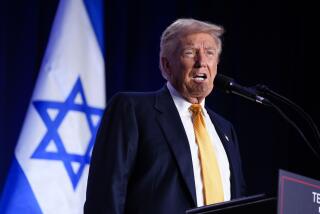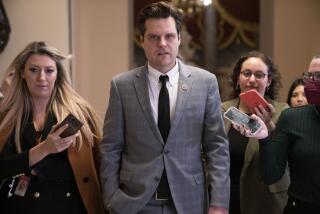From 18 to two to one
How long has the presidential campaign been going?
When it started in spring 2006, America’s voters worried most about the war in Iraq, consumer confidence had reached a four-year high and the Dow Jones industrial average bumped along comfortably above 11,000.
A former small-town mayor named Sarah Palin faced four others in a debate for governor of Alaska. The forum: Comfish, a fishing industry trade show in Kodiak, Alaska.
And Joe Biden made the first of three announcements. “At this moment,” Biden said during a March tour of South Carolina, “I plan on running.” That watershed would be followed, nine months later, by another announcement. Three weeks later, he was in.
It’s been a campaign of halting starts and dazzling flameouts, of historic firsts and dispiriting sameness. Issues, like immigration, dominated and disappeared. Candidates strode in, poised to seize the spotlight, and slunk quietly from the stage.
Now the longest and costliest presidential campaign in American history, which delivered so little certainty and so much passion, promises a definitive end.
“I tuned out at the campaign’s halfway mark, which was 23 months ago,” quipped author Tom Wolfe. “How is Ron Paul doing?”
But for all those exhausted by the race, many more remained transfixed.
“Yes, there may have been more than the usual nonsense. But this is the way it’s done in this country,” said Richard Ben Cramer, who wrote an acclaimed history of the 1988 presidential campaign. “I don’t think it’s bad. It’s just part of the show. And people are really, really paying attention.”
Fits and starts
The campaign began so long ago, it’s hard now to even recall the starting line. Iowans would tell you that, after the 2004 election, John Edwards never really left their state.
Yet most of the men and the one woman who would eventually seek the Republican and Democratic presidential nominations feinted and dodged about their intentions into 2006.
Biden made it official on Jan. 31, 2007. He would have been off and running, except he had to spend the day explaining what he meant when he said Barack Obama was “a mainstream African American who is articulate and bright and clean.”
The senator from Delaware survived his gaffe, but others were done in by theirs.
George Allen’s hopes ended at a rally in summer 2006 when, running for reelection to his U.S. Senate seat in Virginia, he made a lame attempt at a quip, calling a brown-skinned operative of his opponent “macaca.”
The crowd laughed, but Allen could not explain away a word widely viewed as a racial slur. Three months later, he could not even hold his Senate seat.
Next to stumble over a one-liner was John F. Kerry. The Democrats’ 2004 presidential nominee tried to poke fun at President Bush but sounded like he had insulted U.S. troops when he told students at Pasadena City College that, if they didn’t study, they would “get stuck in Iraq.”
Kerry wouldn’t throw in the towel for months. But friends said they knew, in that moment, he was done.
When the fields came into focus in early 2007, the Democrats had mustered seven candidates. Rep. Dennis J. Kucinich, the Ohio congressman who pushed for the impeachment of Bush and Vice President Dick Cheney, was among them.
The Republicans assembled 11, including Rep. Tom Tancredo, who argued that most of the nation’s ills could be solved if illegal immigrants were kept on the other side of the border.
The Democrats debated or appeared together at forums a mind-numbing 26 times before spring 2008. The Republicans held 21 showdowns.
In February 2007, the biggest “news” from the Democratic forum in Carson City, Nev., was that the candidates wanted Obama to distance himself from David Geffen.
His rivals agreed that Obama couldn’t really be the new kind of candidate he claimed if he wouldn’t disown the Hollywood mogul, who had just called Hillary Rodham Clinton an “incredibly polarizing figure.”
The Republicans didn’t have Hollywood names to fight over. And many of the party’s faithful kept telling pollsters they didn’t like any of their choices.
Could they have been turned off by leaden moments, like the one in April 2007 when early primary favorite Mitt Romney assured gun enthusiasts he loved hunting, then had to assure them he wasn’t exaggerating how much he had hunted?
“I’m not a big-game hunter. I’ve made that very clear,” the former Massachusetts governor and private equity millionaire said. “I’ve always been a rodent and rabbit hunter. Small varmints, if you will. I began when I was 15 or so, and I have hunted those kinds of varmints since then. More than two times.”
It wasn’t only Romney facing down the authenticity challenge.
Edwards, the multimillionaire lawyer and former North Carolina senator, had been billing himself as “the son of a mill worker” who cared about poor and middle-class Americans, when The Times reported his campaign had paid a Beverly Hills salon for two $400 haircuts.
Who knew that lapse would later seem a piffle, after the revelation that Edwards had cheated on his wife, Elizabeth, with a onetime New York party girl who had become a videographer on his campaign?
The race to be ‘real’
But authenticity can be an elusive commodity on the campaign trail.
Clinton seemed to enjoy her glass of white wine on her campaign plane, but did she really “mean” those shots of whiskey she threw down with blue-collar voters in Indiana? Did voters give her credit for tipping the waitress at the Maid-Rite restaurant in Iowa $100, as her campaign said it did, or the $0 the waitress remembered receiving?
The Republican contest continued to confound pundits. Conventional wisdom wrote off John McCain, who nearly ran out of money. The leader in national polls, former New York Mayor Rudolph W. Giuliani, effectively sat out the first half-dozen contests.
Texas Rep. Ron Paul raised enough money to rent a blimp. But his fiercely devoted followers couldn’t quite sell his message -- abolishing gun control laws, legalizing marijuana and dismantling the Federal Reserve.
The Republican contest seemed to float in suspended animation, as activists pined for someone who wasn’t there -- Fred Thompson, the Moses-voiced actor and former Tennessee senator.
But when the big dog finally ambled into the race in September 2007, he brought only a modest bark, declining to go after rivals in debates and keeping a leisurely schedule. “I’m not particularly interested in running for president,” Thompson said at one appearance in Iowa.
Mike Huckabee suffered no such passion deficit. And he took the authenticity plebiscite in a walk. Not only did the former Baptist preacher and former Arkansas governor bag a pheasant on a hunting trip a week before the Iowa caucuses, he told reporters how he once liked to fry up squirrel -- in a popcorn popper.
Romney, meanwhile, had trouble getting out of his own way.
Reporters mauled him when they learned he had used a landscaping company that employed undocumented workers. It might not have been so bad if he hadn’t been speaking for months about cracking down on employers who hired illegal immigrants.
Much of the media and the public had waited years expecting to see Clinton ascend to the nomination. But she and the other Democrats had underestimated the Obama phenomenon.
His soaring fundraising and poll numbers never wavered. Not with attacks on his unconventional proposals, including an unusual willingness to talk to foreign dictators. Not by dwelling on his past associations, including with his pastor, the Rev. Jeremiah A. Wright Jr., who once railed “God damn America!”
Obama and Clinton pummeled each other. Was Obama ready to answer that 3 a.m. phone call in the White House? Did Clinton brave sniper fire on a trip to Kosovo? (The answer to the first remained in debate. But the answer to the second became a definitive “no.”)
Slogging it out
Who would have predicted the young black lawmaker would burst into the lead by winning in Iowa, a state with an African American population of less than 3%? Or that he could hold on for victory, losing California, New York and New Jersey to Clinton, because he dominated in Idaho, Utah and Nebraska?
The Republicans matched the Democrats’ pas de deux with a Virginia reel so complex that it actually boosted McCain’s chances when he finished fourth behind Huckabee in the Iowa caucuses, which hurt Romney and helped McCain push to first in New Hampshire.
It also kept enough challengers in the race that they split the vote in South Carolina and handed what turned out to be the decisive win to McCain.
Accepting the Democratic prize before a huge football stadium crowd in Denver late in August, Obama set to yoking McCain to “eight years of failed Republican policies.” And while preaching hope, the Democrat was cold-eyed enough to reject calls to cap his spending.
But McCain seized control of the story line the day after the Democratic convention. He announced he had chosen the obscure Palin as his running mate and electrified his party’s most conservative stalwarts, but many voters came to worry she was out of her depth.
When the financial crisis struck, McCain rushed to Washington to find a fix and demanded the first debate be postponed. He left without a deal and the debate went on.
In the weeks since, the campaign settled into an almost lulling rhythm. McCain attacked. Obama parried. And the polls steadied, with Obama ahead in most of the crucial places.
But the fervor surrounding the race has not dimmed and will be remembered in many ways: In the $700 million Obama is likely to raise. In the 18 million votes won by a female candidate for president. In the long lines of voters days before election day. In the avid viewers and readers who boosted cable television and new websites to record audiences.
Trivia dominated too many news cycles, to be sure.
But in the end, two powerful biographies added new chapters: A Navy aviator who survived 5 1/2 years of torment in Vietnam asked for the chance to serve his country “just one more time,” and a young senator who carved an unlikely story from roots as diverse as the nation’s promised to launch the country on a new journey.
Americans can’t wait to write the ending. But they may miss the story when it’s over.
--
More to Read
Get the L.A. Times Politics newsletter
Deeply reported insights into legislation, politics and policy from Sacramento, Washington and beyond. In your inbox three times per week.
You may occasionally receive promotional content from the Los Angeles Times.










